The Pentacon Six System
by
TRA
Publicity
for Accessories for the Praktisix and the
Pentacon Six
Produced by the Manufacturers
The Pentacon Six (and, before it, the Praktisix) had
a wide selection of accessories designed to extend
the range of the camera and make it easy to use for
many different types of photography. Many of
these accessories had originally been designed for
the Praktina 35mm camera, an instrument appreciated
world-wide by scientists in all disciplines, by
explorers and by others. Some of these
accessories (such as the focussing slide or the
double cable release) could be used unchanged, but
many other accessories (such as the bellows and the
extension tubes) needed to be up-scaled or even
re-designed for use in Medium Format.
Naturally, the larger brochures on the Praktisix and
the Pentacon Six often illustrated most or all of
the accessories, but Pentacon also produced
brochures on the accessories. Naturally, these
brochures contained information on the accessories
for all of the SLR cameras produced by Pentacon
(principally, the Praktica range), but information
on the accessories for the Pentacon Six is also to
be found in the appropriate places.
| 1968 |
|
|
|
|
|
|
|
|
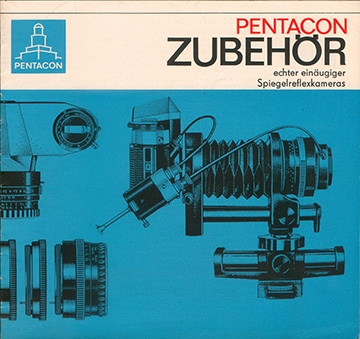
[68_Zub_as.jpg] |
|
German-language brochure
from Pentacon
Approximate dimensions: 200mm ×
190mm
Twelve pages, printed on
good-quality paper
Click on the image here to see the front
cover of the brochure full size.
I here show the front and back covers of
this brochure, and two inside pages.
|
|

[68_Zub_p9s.jpg]
|
|
Page 9 shows five
focussing screens for the Pentacon
Six, as alternatives to the standard
screen. (We note that the
Fresnel screen is not yet featured.)
Four screens are also presented for
Pentacon’s camera of the year and
hope for the future, the 35mm
Pentacon Super.
At the bottom of the page we see the
magnifier head for the Pentacon Six,
which offers correction from -4 to
+2 dioptres, to match the eyesight
of the user. This is
illustrated and described on this
website here
and here.
Click on the image here to see page
9 full size.
|
|
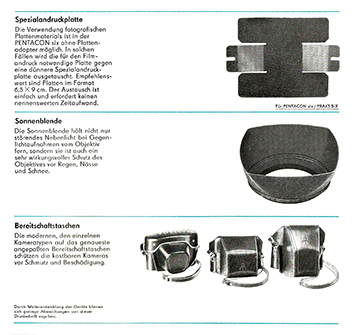
[68_Zub_p11s.jpg] |
|
I am reproducing page 11,
as it shows the seldom-seen special pressure
plate for the Pentacon Six. This
enabled the camera to be used with
individual photographic glass plates, which
were still common at the time. These
had three advantages for precision
scientific photography:
- they guaranteed that the image
plane was absolutely flat (not a problem
with film if it had been loaded
correctly, but perhaps demanded by
scientists who wanted 100% certainty);
- they enabled a single photograph to
be taken and developed immediately,
without waiting to finish a film;
- this in turn enabled precise
exposure modifications, if required for
the subject being photographed.
Click on the image here to see page 11
full size.
At the foot of this page we see, from left
to right, cases for a Praktica camera, for
the Pentacon Super, and for the Pentacon
Six. |
|
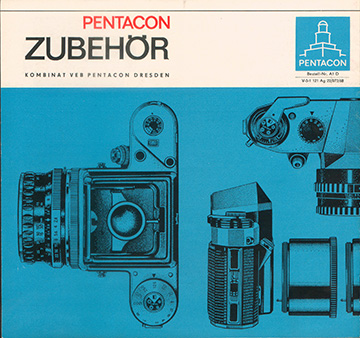
[68_Zub_bs.jpg]
|
|
The back cover of
this brochure shows a Pentacon Six
along with two views of a Praktica
35mm camera, along with auto tubes
for this.
Click on the image here to see the
back cover full size.
|
|
| 1970 |
|
|
|
|
|
|
|
|
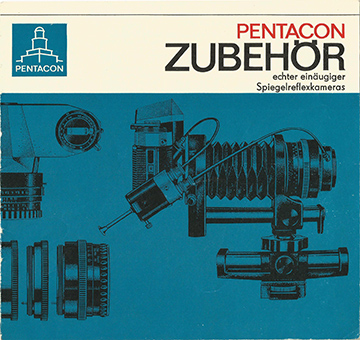
[70_Zub_as.jpg]
|
|
German-language brochure
from Pentacon
Approximate dimensions: 200mm ×
190mm
Twelve pages, printed on
good-quality paper
Click on the image here to see the front
cover of the brochure full size.
Almost a reprint of the 1968 brochure,
above, with only one minor image change (of
a cable release) and one change of title
(for the copying stand)
|
|
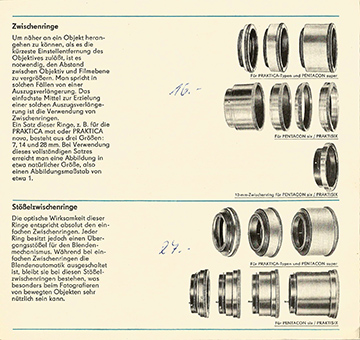
[70_Zub_p3s.jpg]
|
|
Here I reproduce
page 3 of this brochure. The
first title, “Zwischenringe”, means
“intermediate rings”, although in
the UK this was often listed even in
official importer literature as
“Z-rings”. “Manual extension
tubes” would be a more meaningful
translation.
The second title,
“Stößelzwischenringe”, literally
means “intermediate rings with
pins”, although a better translation
would be the phrase mostly used on
this website, namely “Automatic
extension tubes”. East German
translators, no doubt with the help
of the dictionaries available to
them, sometimes called these
“Intermediate rings with plungers”.
We note Pentacon Six / Praktisix
items in both sections. The
person who photographed the manual
tubes (second item down from the
top) failed to unscrew the rear
section from the longest of the
three tubes.
Under that set of tubes we
note the automatic 10mm tube for the
Pentacon Six / Praktisix.
At the bottom of the page is the set
of automatic extension tubes for the
Pentacon Six / Praktisix. For
more information on these tubes, see
here
and here.
Someone has written prices in a
German hand, but it is not certain
whether this is in East Germany or
West Germany. I suspect the
latter, on the basis of the (low)
prices.
|
Click on the image here to see page 3
full size.
|
| 1973 |
|
|
|
|
|
|
|
|
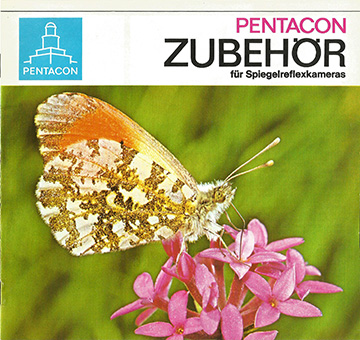
[73_Zub_as.jpg]
|
|
German-language brochure
from Pentacon
Approximate dimensions: 200mm ×
190mm
Twelve pages, printed on
good-quality paper
Click on the image here to see the front
cover of the brochure full size.
This brochure emphasises close-up work with
Praktica 35mm cameras, but does also list
and illustrate the accessories for the
Pentacon Six |
|
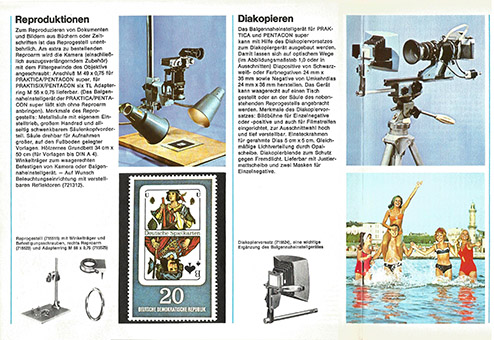
[73_Zub_6-7des.jpg]
Click on the image here to see
these pages full size.
|
|
Here I reproduce
page 6 and part of page 7 of this
brochure. The emphaisis on
these two pages is on Praktica 35mm
cameras, but one accessory for the
Pentacon Six is shown.
For many years Pentacon marketed a
reproduction stand, illustrated
bottom left on page 6 here.
Instead of fastening the camera to
the height-adjustable bracket on the
copier column via the tripod socket
in the base of the camera, it was
possible to screw what Pentacon
called a “copying arm” (German,
“Reproarm”) to the bracket.
This copying arm had a large,
horizontal hole through which the
camera lens could see on the
baseboard the item that was to be
copied. This hole had a 49mm ×
0.75 screw thread, so that any 50mm
standard lens for Praktica 35mm
cameras could be screwed to the
support. This arm has three
advantages:
- The camera is held more
steadily than via the tripod
socket and so it will not sag;
- It is easier for the user
to ensure that the camera is
exactly parallel to the item
being copied;
- The camera is moved further
away from the upright column of
the copying stand, which is
necessary when copying larger
originals.
|
|
|
So where is the Pentacon Six
connection?
Below the picture of the copying arm,
a large ring can be seen (reproduced on a
larger scale than the other items).
It screws onto the 49mm thread on the
copying arm and provides a 58mm × 0.75
thread onto which the Pentacon Six’s 80mm
Biometar lens can be screwed, thus making
the reproduction stand and copying arm
ideal for using the Pentacon Six to make
copies. You can see it in operation
here (just
below the half-way point on the page, on
the left).
|
| 1974 |
|
|
|
|
|
|
|
|
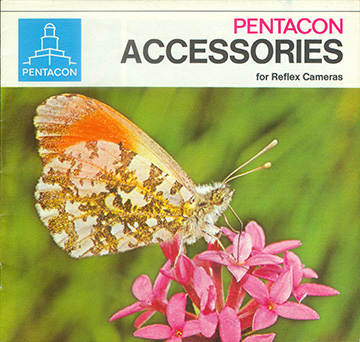
[74_Acc_as.jpg]
|
|
English-language brochure
from Pentacon
Approximate dimensions: 200mm ×
190mm
Twelve pages, printed on
good-quality paper
Click on the image here to see the front
cover of the brochure full size.
This brochure is an English translation of
the above brochure, which had been printed
in the previous year in German.
|
|
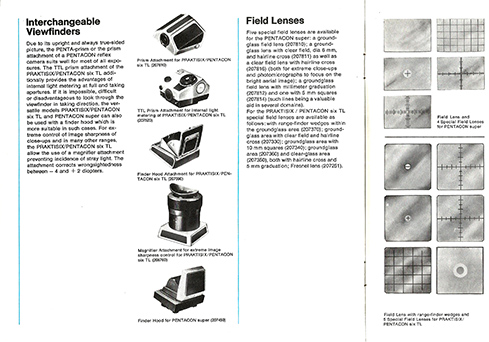
[74_Acc_p8-9s.jpg]
|
|
Here I reproduce
page 8 and part of page 9 of this
brochure, which present viewfinders
and “Field Lenses”, as they are
called here, also known as
“Focussing Screens”, for the
Pentacon Six and the Pentacon
Super. By 1974 it had become
clear that the Pentacon Super had
not been a commercial success, and
production had been ceased, but
Pentacon was still strying to shift
the accessories that it had
manufactured for this camera.
In the English text on the left we
see some of the limitations in the
English of the East German
translators, with whom we
sympathise, given that they were not
permitted to travel to
English-speaking countries to study
English.
Click on the image here to see page
8 and the first column of page 9
full size.
|
|
| 1975
|
|
|
|
|
|
|
|
|
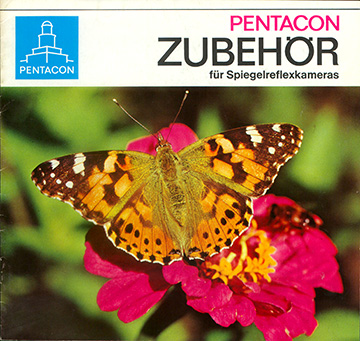
[75_Zub_as.jpg]
|
|
German-language brochure
from Pentacon
Approximate dimensions: 200mm ×
190mm
Twelve pages, printed on
good-quality paper
Click on the image here to see the front
cover of the brochure full size. |
|
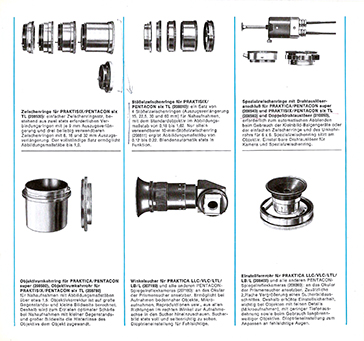
[75_Zub_p5s.jpg]
|
|
Here I reproduce
page 5 of this brochure.
The first two sections, top-left and
top-centre, have the images and the
text transposed, as the first
section shows the automatic
extension tubes but the description
is of the manual tubes, while the
second section shows the manual
tubes but the description is of the
automatic tubes. This does
perhaps reveal that the people in
Pentacon’s publicity department who
prepared this brochure were not
personally familiar with the
Pentacon Six – or at least, not
familiar with the extension tubes.
In East Germany itself, Pentacon’s
cameras were horrendously expensive,
their costs equalling several
months’ salary. I was
therefore not surprised to meet in
East Germany in 1981 an East German
who looked at my Pentacon Six and
said that he had clubbed together
with two other men and they had
bought a Pentacon Six between the
three of them, and shared it.
Click on the image here to see page
5 of the brochure full size.
The last two items on this page
will not fit on the Pentacon Six, as
they have the new square mount
required for the viewfinders of the
Praktica “L” series cameras.
You can see the shape of the
Pentacon Six viewfinder mount here.
|
|
| 1976 |
|
|
|
|
|
|
|
|
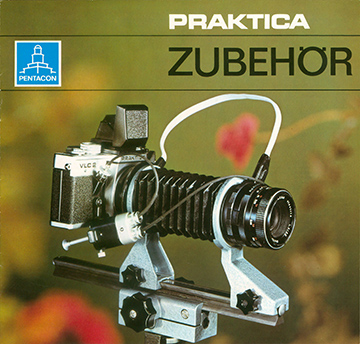
[76_Zub_as.jpg] |
|
German-language brochure
from Pentacon
Approximate dimensions: 200mm ×
190mm
Twelve pages, printed on
good-quality paper
The title alone shows the emphasis in
1976: it was the promotion of Praktica
(i.e., 35mm cameras) – even though the
Pentacon logo continues to feature
prominently. The front photograph
clarifies this emphasis further: it is the
promotion of the Praktica VLC 2, at the time
the top camera in Pentacon’s 35mm camera
range.
However, the brochure does still include the
accessories for the Pentacon Six TL, which
are illustrated and described.
Click on the image here to see the front
cover of the brochure full size. |
|
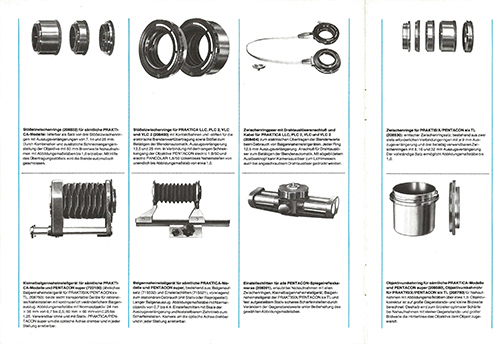
[76_Zub_4-5s.jpg]
|
|
Here I reproduce
page 4 and the first column of page
5 of this brochure. We can see
that the error in page 5 of the 1975
brochure (above) has been corrected:
the picture of the manual
tubes is now shown above the text on
the manual tubes. In the next
column (not reproduced here) the
images of the automatic
tubes are reproduced above the text
on the automatic tubes.
Beneath these tubes is the Pentacon
Six / Praktisix reversing tube,
along with a reversing ring for the
35mm cameras.
The last item at the bottom of the
previous page is the focussing
slide, designed to be used between a
tripod and the camera (whether 35mm
or 6×6) or the corresponding camera
bellows, to facilitate precise
adjustment of the distance of the
camera from the object being
photographed. This is
extremely useful in macro
photography.
Click on the image here to see page
4 and the section of page 5 full
size. |
|
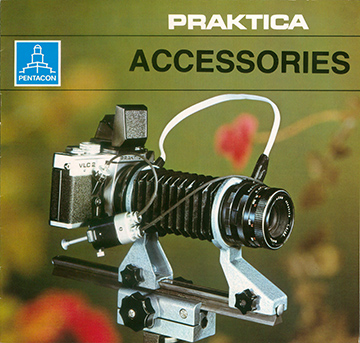
[76_Acc_as.jpg]
|
|
English-language brochure
from Pentacon
Approximate dimensions: 200mm ×
190mm
Twelve pages, printed on
good-quality paper
This is the English-language translation of
the above brochure.
The Praktica VLC pictured here had the meter
incorporated within the body, so that the
prism could, as here, be removed and
replaced with a different viewfinder.
And lens aperture values were transferred
electrically to the camera metering
circuit. The use of bellows here
required an electrical cable to transfer
these values to the camera. When no
bellows were being used, such a cable was
not necessary – and the extension tubes for
the VLC transferred the electrical signal
internally, without needing an external
cable.
What a pity that all these innovative
features were not introduced to the Pentacon
Six TL!
Click on the image here to see the front
cover of the brochure full size.
|
|
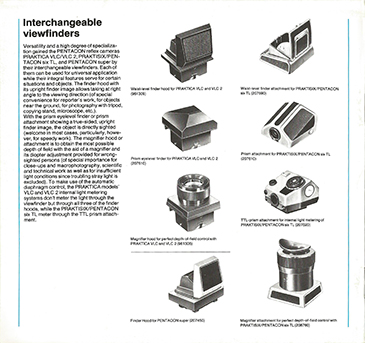
[76_Acc_8s.jpg]
|
|
Here I reproduce
page 8 of this brochure.
Comparing this with page 8 of the
1974 edition of the equivalent
brochure (reproduced above), we see
that with the addition of the VLC
camera to the 35mm range, space has
been made to provide pictures of the
three VLC viewfinders, and that the
“waist-level finder” for the
now-discontinued Pentacon Super 35mm
camera continues to be featured.
Click in the image here to see page
8 full size.
|
|
| 1978
|
|
|
|
|
|
|
|
|
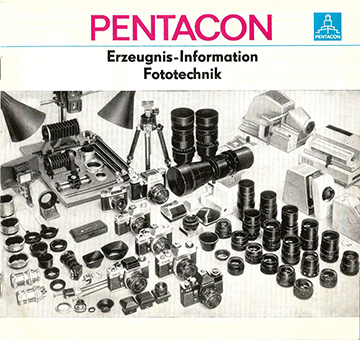
[78_Erz_as.jpg]
|
|
German-language brochure
from Pentacon
Approximate dimensions: 200mm ×
190mm
Twelve pages
Black-and-white photographs throughout, with
limited use of blue lines on some pages
“Erzeugnis-Information Fototechnik” means
“Photo Technology Product
Information”. This title really sounds
like “Industrial speak” rather than
customer-orientated. In addition to
this (not to mention the essentially
monochrome printing), references to “Zeiss”
and other disputed brand names abound, from
which I deduce that this brochure was
principally intended for use within East
Germany.
Click on the image here to see the front
cover of the brochure full size. |
|
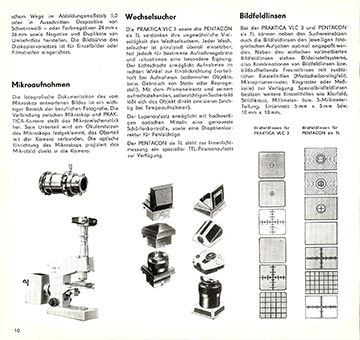
[78_Erz_p10s.jpg]
|
|
Here I reproduce
page 10 of this brochure, which
principally looks at viewfinders and
focussing screens for the Pentacon
Six TL and the 35mm Praktica VLC
3. The titles above the two
columns of focussing screens are
obviously in the wrong place, as the
square screens are for the Pentacon
Six TL, while the rectangular
screens are for the VLC 3.
Click on the image here to see page
10 of the brochure full size.
|
|
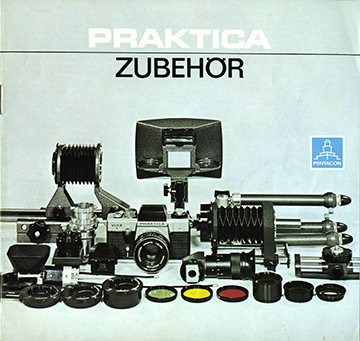
[78_Zub_as.jpg]
|
|
German-language brochure
from Pentacon
Approximate dimensions: 200mm ×
190mm
Eight pages, printed on
good-quality paper
In contrast to the above 1978
brochure, this full-colour publication would
appeared to be targeted at an international
audience. We again note that the
headline title “PENTACON” has been replaced
by “PRAKTICA”, the only East German SLR
camera range that was now being promoted
outside the East German state.
We also note that the Pentacon logo is much
smaller and less prominent than in the 1976
brochures, above.
However, accessories for the Pentacon Six /
Praktisix do continue to be illustrated and
described.
Click on the image here to see the front
cover of the brochure full size.
|
|
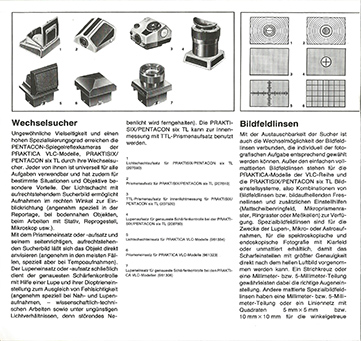
[78_Zub_6s.jpg] |
|
Here
I reproduce page 6 of this
brochure, on which the four
viewfinders for the Pentacon Six
TL are featured, along with the
viewfinders for the Praktica VLC
35mm camera. We note that
the waist-level finder for the
Pentacon Super is no longer
featured. Note that facing
page 7 is reproduced below from
the English version of this
brochure.
Is it a sign of
financial constraints in East
Germany that there has been a 33%
reduction in the number of pages
in this brochure, compared with
those issued in previous years,
including in 1976?
Click on the image here to see
page 6 full size.
|
|
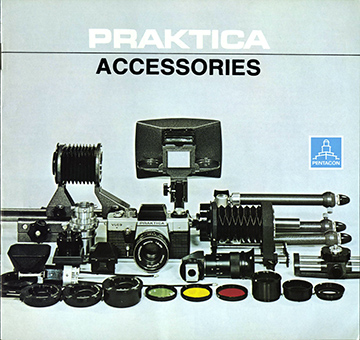
[78_Acc_as.jpg]
|
|
English-language brochure
from Pentacon
Approximate dimensions: 200mm ×
190mm
Eight pages, printed on
good-quality paper
This is the English-language translation of
the above brochure.
We note the Pentacon tripod, the focussing
slide and the double cable release, items
which are not camera-specific and can
therefore be used with the Pentacon Six /
Praktisix.
Whereas the 1976 brochures featured the
Praktica VLC 2, this 1978 version features
the newer (and final) version of the VLC,
the VLC 3.
|
|
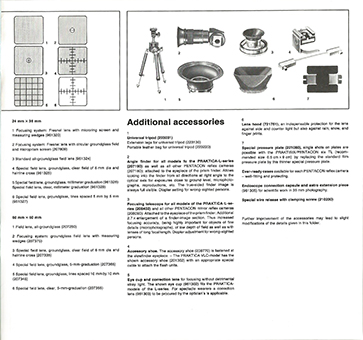
[78_Acc_7s.jpg]
|
|
Here I reproduce
page 7 of this brochure, which faces
page 6, the German version of which
is reproduced above. It
illustrates and describes the
focussing screens for the Pentacon
Six, the tripod and the special
pressure plate, which is described
in more detail above, in the
commentary on page 11 of the 1968
brochure.
Click on the image here to see page
7 full size.
|
|
| 1979 |
|
|
|
|
|
|
|
|
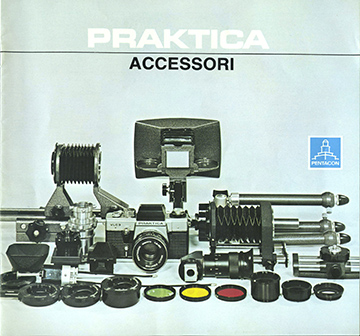
[79_It_as.jpg]
|
|
Italian-language brochure
from Pentacon
Approximate dimensions: 200mm ×
190mm
Eight pages Full colour on front cover
and three inside pages
This is the Italian translation of the above
1978 German brochure. Illustrations
thoughout are identical with those in the
German brochure (and in the English
translation), and it would appear that the
text translates the German without
introducing any new or different information.
Click on the image here to see the
front cover of the brochure full size.
|
|

[79_It_p3s.jpg]
|
|
Page three of this
brochure shows and describes
accessories for the Pentacon Six TL
and the Praktica VLC 3 that are
useful or essential for macro
photography, a specialist area for
this manufacturer since the 1950s,
when the company had its original
name, KW. Other accessories
for these two cameras are shown and
described on pages 6 and 7 of this
brochure, which are reproduced above
(page 6 in German and page 7 in
English).
Pentacon did of course
produce publicity in many languages,
and this section of the website
makes no effort to reproduce
literature from all of the languages
concerned.
Click on the image here to see
page 3 full size.
|
|
| 1981 |
|
|
|
|
|
|
|
|

[81_Erzeug_as.jpg]
|
|
German-language brochure
from Pentacon
Approximate dimensions: 200mm ×
190mm
Sixteen pages
Black-and-white photographs throughout, with
limited use of blue lines on some pages
This 1981 brochure is very much in the
style of the 1978 brochure shown
above. A new cover photograph has been
produced, adding the new “B” series Praktica
cameras with lens bayonet mounts.
However, the Praktica cameras with M42 screw
mount that were current at the time are
included, as is the Pentacon Six TL plus its
metering prism and magnifier head, as well
as some lenses for it. We note that
the 35mm VLC with interchangeable
viewfinders has disappeared from the range.
Click on the image here to see the front
cover of the brochure full size. |
|

[81_Erz_p12s.jpg]
|
|
We note the
increase in pages in comparison with
the 1978 brochure above. This
edition does of course promote the
whole of the current range of 35mm
cameras, but especially devotes
space to the new Praktica cameras
with bayonet lens mount, as well as
covering rangefinder cameras for the
first time since the “Jedem Seine
Kamera” (“A Camera for Everyone”)
brochures of the 1950s and
60s. It also introduces a
miniature camera that is Pentacon’s
answer to the 110 cameras released
by Western manufacturers over the
previous two or three years, and
more space is devoted than
previously to Pentacon 35mm slide
projectors. In amongst all
these innovations, the Pentacon Six
camera and accessories continue to
feature, as illustrated here on page
12.
One gets the impression of a company
that is seeking to satisfy rising
domestic consumer demand in a
country where importing photographic
equipment from non-communist
countries was not permitted.
Click on the image here to see page
12 full size.
|
|
|
|
|
|
|
|
|
|
|
|
|
|
|
|
|
|
|
|

























